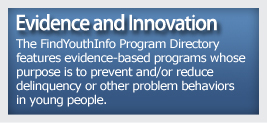Federal Programs for Transitioning to Employment
Federal agencies provide youth with a variety of opportunities to explore careers in the federal government and develop and learn skills necessary for employment. The Student Educational Employment Program, comprised of the Student Temporary Employment Program (STEP) and the Student Career Experience Program (SCEP), was established in 1994 to streamline federal efforts to provide career exploration and employment opportunities to youth and young adults. Youth taking at least half-time academic, vocational, or technical courses in an accredited high school, technical or vocational school, two- or four-year college or university, or graduate school are eligible to participate. STEP provides opportunities for youth to explore new career fields and gain employment experience through internships that may or may not be directly related to their academic or career goals. SCEP is a work-study partnership between the students, the educational institutions, and various federal agencies which provide youth with job experience directly related to their academic field and the opportunity for permanent employment upon completion of job and academic requirements (U.S. Office of Personnel Management, n.d.).
In addition to federal career internships, many federal agencies and departments, including the Department of Labor, the National Corporation for Community Service, the Department of Defense, and the Department of the Interior, provide opportunities for youth to explore careers, develop skills, and transition to employment. These programs strive to help both youth who are in school and out-of-school youth to develop skills and opportunities for employment.
(click “+” to see more details.)
Workforce Investment Act (WIA) Youth Programs
This program provides funds to states to support local workforce investment areas, which deliver a comprehensive array of youth services that focus on assisting low-income youth ages 14 to 21 with one or more barriers to employment. Programs prepare youth for post-secondary educational and employment opportunities, helping them to attain educational and/or skills training credentials and secure employment with career/promotional opportunities. Services include tutoring, summer employment opportunities, occupational skill training, leadership development, supportive services, mentoring, follow-up services, work experience, alternative secondary school offerings, and comprehensive guidance and counseling. A WIA youth provider can be located here and additional information can be found here.
The YouthBuild program enables youth between the ages 16 and 24 who are at risk to obtain academic and occupational skills training leading to the completion of a high school diploma, GED, or industry recognized credential. The program model includes a combination of academics, leadership development, and vocational skills building to prepare youth for employment in the construction industry. Grants are awarded to qualifying organizations through a solicitation for grant applications (SGA). YouthBuild provides a wide range of experiences for participants including opportunities to
- participate in community service and service-learning experience;
- receive personalized counseling, mentoring, and adult support from a caring role model that is committed to their success;
- obtain a high school diploma or GED for those who have dropped out of school;
- develop job skills focused on construction training, resulting in an industry-recognized credential;
- build leadership and civic engagement experience through shared governance of the program and the chance to make decisions and policies related to the program; and
- create a community of peers and ongoing support through an alumni network (YouthBuild USA, n.d.).
Currently the Department of Labor (DOL) funds 223 organizations across the country to operate YouthBuild programs serving approximately 7,500 youth per year. Learn more about DOL’s YouthBuild program.
Reintegration of Ex-Offenders Program
The Department of Labor’s Reintegration of Ex-Offenders (RExO) Program targets court-involved youth, young adults, and adult ex-offenders through a variety of discretionary grant awards. Organizations partner with juvenile and adult justice systems to assist in providing employment and training to this population of individuals who may find it difficult to obtain employment or training without additional assistance. Projects support a comprehensive strategy for serving youth in a local area to which many are returning from juvenile correctional or detention facilities. Both the adult and youthful offender grants serve as demonstration projects for improving communities with high rates of crime and poverty.
Established in 1964, Job Corps is the nation’s largest federally-funded, primarily residential, training program for at-risk youth, ages 16 to 24. With 125 centers in 48 states, Puerto Rico, and the District of Columbia, Job Corps provides economically disadvantaged youth with the academic, career, technical, and employability skills to enter the workforce, enroll in post-secondary education, or enlist in the military.
Serving approximately 60,000 participants each year, Job Corps emphasizes the attainment of academic credentials, including a High School Diploma and/or General Educational Development (GED), and career technical training credentials, including industry-recognized certifications, state licensures, and pre-apprenticeship credentials.
These portable credentials provide for long-term attachment to the workforce and economic mobility as Job Corps graduates advance through their careers. They ensure that program graduates have gained the skills and knowledge necessary to compete in today’s workforce
Of the participants in the 2010 program year, 64.7 percent had dropped out of high school with the majority reading below an eighth-grade reading level, 40.2 percent came from families on public assistance, over 20 percent had a disability, 7.3 percent were parents, and 4.2 percent were involved in foster care or were runaway and homeless youth. Approximately 84 percent of program year 2010 graduates were placed, with 67 percent placed in jobs or the military and approximately 17 percent enrolled in education programs. In addition, more than 33,000 students completed career technical training and more than 20,200 students obtained high school diplomas or GED certificates. Learn more about Job Corps.
AmeriCorps National Civilian Community Corps
AmeriCorps National Civilian Community Corps (NCCC), funded by the Corporation for National & Community Service, is a full-time, residential program for men and women aged 18 to 24. The program is a ten-month commitment focused on strengthening communities and developing leaders through direct, team-based national and community service in partnership with non-profits—secular and faith based, local municipalities, state governments, federal government, national or state parks, Indian Tribes and schools. Participants are provided a $4,000 stipend for the ten months of service (about $200 every two weeks before taxes), housing, meals, limited medical benefits, up to $400 a month for childcare (if necessary), member uniforms, and a Segal AmeriCorps Education Award to help with college costs upon successful completion of the program. Through their service, participants gain valuable experience that translates directly into job experience in a chosen field. They learn teamwork, communication, responsibility, and other essential skills. Learn more about AmeriCorps NCCC’s collaboration with the Department of Defense's National Guard Youth ChalleNGe Program.
21st Century Conservation Service Corps
The 21st Century Conservation Service Corps (21CSC) is based on service-learning principles that help youth to develop environmental and civic responsibility while acquiring knowledge, job skills, and exposure to careers in natural and cultural resource management. Young people between the ages of 15 and 25 from diverse backgrounds, including tribal and under-served populations, those who have little or no opportunity to experience the outdoors, and young women and girls, can participate in eight- to ten-week projects during the summer or through full-time employment. Examples include:
- The Department of the Interior funded Youth Conservation Corps
- The National Park Service partnership with non-profit organizations to support the Public Land Corps
- The National Park Services Youth Internship Program (YIP)
- The Department of the Interior’s multi-year Career Discovery Internship Program for college students
- The Conservation and Land Management Internships that places interns within the Bureau of Land Management, National Park Service, and U.S. Forest Service field offices
National Guard Youth ChallenNGe Program
The National Guard Youth ChalleNGe Program, sponsored by the Department of Defense, is a residential program for youth ages 16 to 18 who have dropped out of or been expelled from high school, and who are unemployed, not heavily involved with the criminal justice system, drug free, and legal residents of the state in which the program is offered. The program is focused on eight components: leadership, responsible citizenship, service to community, life-coping skills, physical fitness, health and hygiene, job skills, and academic excellence. A large focus is on preparing youth for the GED exam or for a high school diploma. Following the residential phase of the program, youth are paired with a mentor who continues an ongoing relationship with the youth for at least a year. A 2009 evaluation found that youth who participated in the National Guard Youth ChalleNGe Program were more likely than the control group to have attained a GED or a high school diploma and were more likely to be working or attending college (Bloom, Gardenhire-Crooks, & Mandsager, 2009). Learn more about the collaboration between National Guard Youth ChalleNGe Program and AmeriCorps NCCC.
Career and Technical Education Grants
Career and Technical Education grants are funded through the Department of Education to help state and local schools offer programs to develop the academic, vocational, and technical skills of students in high schools, community colleges, and regional technical centers. Funds from this program can be used for a broad range of programs, services, and activities designed to improve career-technical education programs and ensure access to students who are members of populations with special needs. Additional grants provide resources targeted at Native Americans, Alaskan Natives, and Native Hawaiians (U.S. Department of Education, n.d.).
Learn about these models and others by visiting the Transition Age Youth Topic.
Bloom, D., Gardenhire-Crooks, A., & Mandsager, C. (2009). Reengaging high school dropouts: Early results of the National Guard Youth ChalleNGe Program evaluation. MDRC. Received from http://www.jobsfirstnyc.org/docs/Reengaging%20High%20School%20Dropouts.pdf (PDF, 102 pages)
U.S. Department of Education. (n.d.). Office of Vocational and Adult Education programs and initiatives. Retrieved from http://www2.ed.gov/about/offices/list/ovae/programs.html
U.S. Office of Personnel Management. (n.d.). Student educational employment program. Retrieved from http://www.opm.gov/employ/students/intro.asp
YouthBuild USA. (n.d.). Programs. Retrieved from https://youthbuild.org/youthbuild-programs
YouthGo. (n.d.). 21st Century Conservation Service Corps. Retrieved from http://youthgo.gov/employment-program/21st-century-conservation-service-corps
Resources
WIA Youth Formula-funded Grants
The Workforce Investment Act (WIA) of 1998 enacted a formula-funded youth program serving eligible low-income youth, ages 14 to 21, who face barriers to employment. Funds for youth services are allocated to state and local areas based on a formula distribution. Service strategies, developed by workforce providers, prepare youth for employment and/or post-secondary education through strong linkages between academic and occupational learning. In a typical year, DOL’s youth programs will serve more than 250,000 – 300,000 at-risk youth. The most common services include education in the form of basic literacy, high school and GED preparation, soft skills and occupational training, job development and placement services, summer employment, work experiences, and counseling.
Youth Services Discretionary Grants
This site describes the discretionary grants funded through the Department of Labor’s Employment and Training Administration, Office of Workforce Investment, Division of Youth Services. These grants are aimed at specific populations of at-risk youth, such as young offenders and youth living in high-poverty areas.
Make a Commitment to Summer Jobs
The Department of Labor is partnering with business leaders, elected officials, and non-profits to create, publicize, and fill 100,000 jobs for low-income, young people aged 16 to 24. This site provides information about the benefits of summer employment, employment opportunities, and business and organizations committed to the partnership.
YouthGo
Youth in the Great Outdoors is an initiative of the U.S. Departments of the Interior and Agriculture. YouthGo strives to empower our youth to be the next generation of conservation leaders by employing youth to protect, revitalize, and restore the environment and communities, educating youth about the environment and purposefully engaging youth from all backgrounds. YouthGo provides information and available career and internship opportunities for youth. YouthGo has numerous partner organizations including 4-H, Job Corps, the Corporation for National Community Service, and many others.
Workforce3 One
Workforce3 One is a website sponsored by the Department of Labor, Employment and Training Administration. It provides information and resources for workforce professionals, employers, economic development, and education professionals. Online learning events, resource information, and tools help organizations learn how to develop strategies that enable individuals and businesses to be successful in the 21st century economy.
Ticket to Work Program
The Ticket to Work Program provides most people receiving Social Security benefits (beneficiaries) more choices for receiving employment services. Under this program, the Social Security Administration (SSA) issues tickets to eligible beneficiaries who, in turn, may choose to assign those tickets to an Employment Network (EN) of their choice to obtain employment services, vocational rehabilitation services, or other support services necessary to achieve a vocational (work) goal. The EN, if they accept the ticket, will coordinate and provide appropriate services to help the beneficiary find and maintain employment. Learn more about Ticket to Work.
Youth Topics
Collaboration Profiles
Feature Articles
Tools & Guides
Programs
Technical Assistance
Websites
Publications
Videos & Podcasts
Data Sources
Agencies
Departments


Announcements

Map My Community is a tool designed specifically to assist you in locating resources in your community to help you build and strengthen your youth program. Get ideas for new partnerships, identify gaps in your community, and learn about resources to avoid duplication of effort.



















